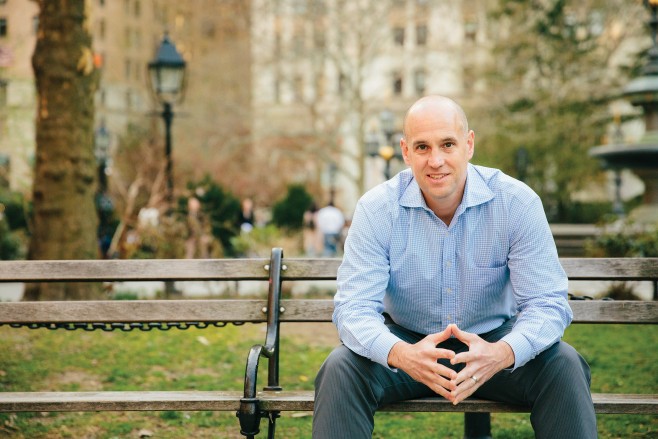
For Bradford Glick ’95, Emory University’s joint law and theology program offered him the education he wanted for working at systemic change. (Photo by Steven Stauffer)
During his first decade of adult employment, Bradford Glick ’95 worked in wilderness settings, always with youths, sometimes with juvenile delinquents. During his second decade, he has studied and worked in law.
The connection between the two fields? Enabling as many people as possible “to experience a life of dignity and hope,” says Glick, a New York State attorney.
After graduating in 1995 with a major in camping, recreation and outdoor ministries (minoring in socio-economic development), Glick became a counselor at Eckerd Youth Alternatives, working with juvenile delinquents in the wilderness of northern New Hampshire.
Beginning in 2000, Glick spent five years as manager of the wilderness expeditions program at Spruce Lake Retreat, a Mennonite-affiliated camp in Canadensis, Pennsylvania.
At both locations, Glick felt frustrated that too many times the positive changes experienced by these young people would fade when they returned home in the absence of adequate support from their schools and families. “I wanted to work at systems change,” he decided. “The only question was whether that was best accomplished through legal/policy structures or through community development.”
Emory University’s joint law and theology program offered him the combination he sought. On his application for 2005 admission, Glick wrote, “My goal is to work on as high a level as possible to effect change, but to never lose sight of what it is I hope to change, which is the ability of each person to experience a life of dignity and hope.” He received a full scholarship and stipend as a Robert W. Woodruff Fellow.
At Emory, Glick’s experience working with juvenile delinquents led first to a focus on criminal justice reform, then to housing policy development. He also worked at protecting the medical rights of detainees in Guantanamo Bay. Along the way, he became acutely aware of the relationship between people’s beliefs in socio-economic fairness and their support of policies that seek to protect and improve the wellbeing of individuals. “I recognized that our individual and communal core beliefs of right and wrong – and [beliefs] about the nature of the person – are central to any reform and policy development,” he says.
By 2009, Glick had successfully crammed a three-year JD program and a two-year master’s in theological study program into four years of intense study. Along the way, he served as the executive symposium articles editor for the Emory International Law Review.
“It was definitely hard – competing in a curved grading system certainly takes a toll on your personality, knowing the only way to get an A is to beat out 90% of the other students in the class – but that competition pushed me to produce my best work,” he says.
In 2010, he joined the law firm of Sutherland Asbill & Brennan LLP, in New York City. Glick also served on the junior board for CASA-NYC, an advocacy organization for children and youth. In 2012, he moved to his current position with the New York State Office of the Attorney General. He now works in the litigation bureau as defense counsel for the state’s Department of Health, focusing primarily on Medicaid, administration and civil recovery audits, and professional or medical misconduct. “Working with the Department of Health to protect the health and welfare of the New York public is an honor,” he says.
Outside of work, he is interested in the law of freedom of religion and has coordinated continuing legal education programs on freedom of religion and human rights.
He is also involved in the Federal Bar Council Inn of Courts and the American Constitution Society. The caliber of the attorneys and judges in these groups keeps him inspired, he says, “to raise the quality of my own work and to make sure that I am using my position as an attorney to give back to the community.”
Glick is married to Susanne Clark Glick, who works in medical publishing. As he did when he was a wilderness-based counselor, he enjoys the outdoors and spends his free time skiing, sailing and hiking.